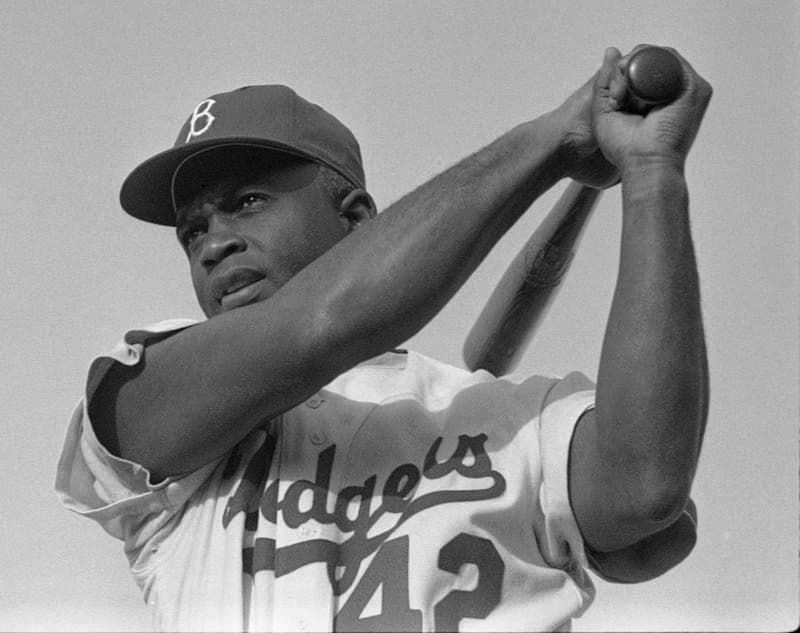When Jackie Robinson Voted for Nixon and Rebuked Malcolm X
‘True’ beautifully details Robinson’s decency and grit, revealing him to be a generous yet determined fighter for justice.

Major League Baseball is gearing up to celebrate the 75th anniversary of Jackie Robinson breaking the sport’s color barrier.
After becoming the first black player in the big leagues on April 15, 1947, when Martin Luther King Jr. was 18, Robinson went on to have a Hall of Fame career, batting .313 lifetime and playing in six World Series. His jersey has been retired by every team, and all MLB players, managers, coaches, and umpires will wear Jackie Robinson’s No. 42 in Dodger blue on April 15.
As a fascinating and well-researched new book points out, Robinson (1919-72) was also outspoken about politics. In “True: The Four Seasons of Jackie Robinson,” sports writer Kostyra Kennedy reminds readers that while Robinson was a devoted friend to King and a supporter of the civil rights movement, he also voted for Richard Nixon in 1960 and rebuked a militant black leader, Malcolm X.
“The Democratic Party, Robinson felt, took the Black vote too quickly for granted,” Mr. Kennedy writes. “He thought that perhaps in his dissent he might help spur more urgency on both sides when it came to civil rights. Wary as he was of the creeping right-wing element in the Republican base, neither could he look past the Democrats’ tether to the Dixiecrats of the South.”
Robinson’s endorsement of Nixon cost him. At the time, he was retired from baseball and acting as a goodwill ambassador for Chock full o’Nuts and a columnist for the New York Post. According to “True,” the Nixon endorsement forced “a temporary leave of absence” at the coffee company and ended his column.
Soon after, Robinson began writing a syndicated column that appeared in such publications as the New York Amsterdam News and the Chicago Defender. According to “True,” Robinson “chastised Malcolm X, objecting to his brand of militancy and to his separatist views.” Malcolm X responded “with unveiled ire,” rebuking Robinson “for his allegiance to his ‘white boss’ and his ‘white benefactors’ and for supporting Nixon, and for his general approach.” Malcolm X charged that Robinson would “never take an interest in anything in the Negro community until the white man himself takes an interest in it.”
Robinson shot back, “Coming from you an attack is a tribute,” and added that he was proud of his association with baseball’s Branch Rickey and with New York’s governor, Nelson Rockefeller, for whom Robinson would work.
The book also notes that when he was inducted into the Baseball Hall of Fame in 1962, Robinson “asked that his plaque make no mention of his role in integrating baseball.” Robinson’s wife Rachel later had it changed to describe the tremendous courage Robinson displayed in 1947 and after.
“True” beautifully details Robinson’s decency and grit, revealing him to be a generous yet determined fighter for justice who supported King’s nonviolent approach while making clear that he would “punch back” if assaulted at a civil rights march. Handsome and with the powerful body of a linebacker, Robinson was also a dedicated father and husband and a veteran of World War II.
Also featured are lively accounts of Robinson’s electrifying style of play. Robinson was famously effective at base running — juking, psychologically tormenting, and faking out pitchers to the point that some became flabbergasted. Robinson stole 200 bases in his career, 12 of them home plate.
“Seventy-five years ago, Jackie Robinson took the field under incredibly challenging circumstances and unimaginable pressure. Yet through his courage, character, skill, and values, he brought well-needed change to our game and advanced the Civil Rights Movement in our country,” the current baseball commissioner, Robert Manfred Jr., said in a recent announcement of the upcoming tributes.
“During this special anniversary year, it is a top priority for MLB to honor Jackie’s contributions and legacy, recognize the impact Rachel has made through the Jackie Robinson Foundation, and continue to keep Jackie’s memory and values alive for today’s generation of players and fans.”

